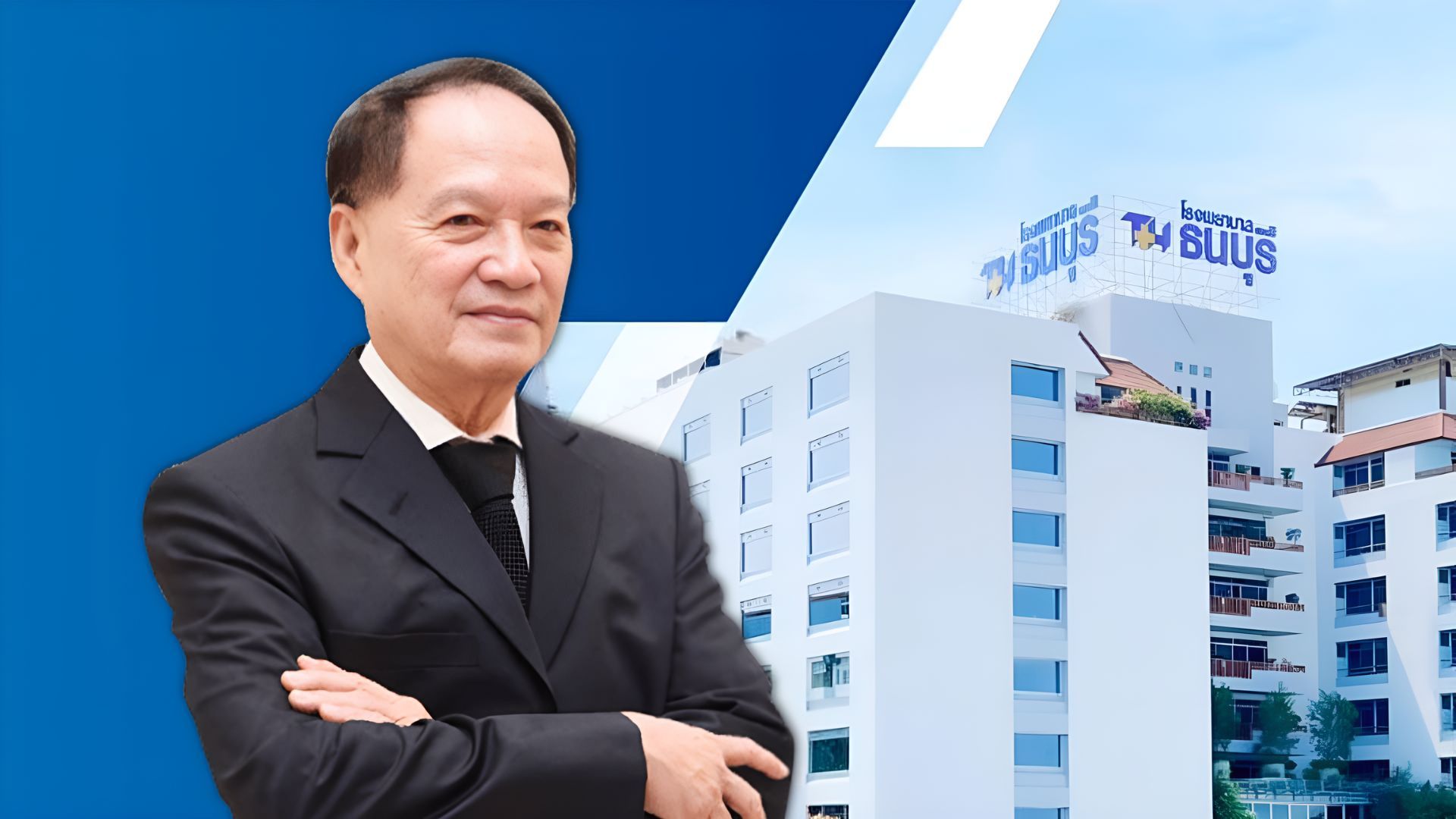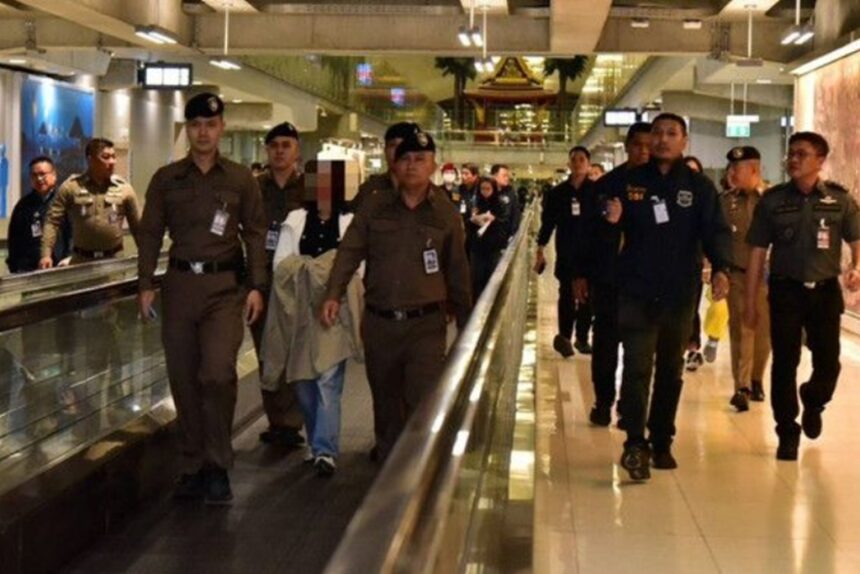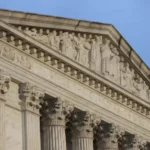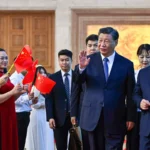BANGKOK – A fugitive broker connected to the Bt7.5-billion (US$217 million) fraud case involving Dr. Boon Vanasin, the former chairman of Thonburi Healthcare Group, has been captured in China and sent back to Bangkok.
The suspect, identified as Thitiporn, had been on the run since an arrest warrant was issued for her in December last year. She is the 14th person arrested in connection to this case.
According to Wissanu Chimtrakul, deputy director-general of the Department of Special Investigation (DSI), Thitiporn, along with Dr. Boon and another broker, Kotchaporn, had been placed on Interpol’s red notice list after fleeing Thailand.
Thitiporn was apprehended in China and deported at the request of Thai authorities. She was taken into custody upon landing at Suvarnabhumi International Airport on Sunday night. Wissanu addressed the media at the airport, but the suspect was not present during the briefing.
Two key suspects remain at large: Dr. Boon, reportedly in China, and Kotchaporn Suwannakut. Initial reports suggested Dr. Boon, 86, had been arrested in China and handed over to Thai authorities, though this remains unconfirmed.
Dr. Boon is wanted on charges of fraud, with damages estimated at Bt7.5 billion. He has been listed under an Interpol red notice since fleeing the country. His wife and daughter, also accused of luring victims into fraudulent medical investments, are currently in Thai custody awaiting trial.
Between December 2023 and October 2024, 247 complaints were filed against Dr. Boon at Huai Khwang Police Station by victims unable to cash checks issued by him.
The Dr. Boon Scandal
Dr. Boon Vanasin, the founder and former chairman of the Stock Exchange of Thailand-listed Thonburi Group (THG), became the subject of national headlines after being accused of fraud. The scheme involved enticing the public to invest in bogus medical projects, leading to massive financial losses.
Police reports indicate that from December 2023 to October 2024, victims lodged 247 complaints at Huai Khwang Police Station, alleging they couldn’t cash post-dated checks issued by Dr. Boon. He fled to China following these accusations, leaving behind a trail of financial chaos.
Authorities have charged him and eight other individuals with multiple offenses, with damages initially estimated at Bt7.5 billion.
The investigation revealed that Dr. Boon and his associates persuaded people to invest in non-existent medical projects.

Who Is Dr. Boon?
Dr. Boon Vanasin and his wife, both from a respected family, built a reputation that earned trust in medical and investment circles. He founded THG in 1977 and expanded the business significantly, eventually listing it on the Stock Exchange of Thailand in 2017.
THG manages seven hospitals in Thailand and two abroad, with 1,100 registered beds and a daily capacity of 9,700 outpatients, making it one of the top healthcare providers providing access to health care across the country.
Dr. Boon frequently spoke at public events, positioning himself as a leader in healthcare for Thailand’s aging population. Using his public credibility, he promoted projects like a cancer center, a wellness center in Bangkok, a senior-focused condominium near the Chao Phraya River, hospitals in Laos and Vietnam, and a medical intelligence initiative in Chon Buri province.
How Did the Fraud Happen?
Dr. Boon and his team used their influence and reputation to attract investors to what appeared to be legitimate projects. They offered loan agreements with high-interest rates and issued post-dated checks to investors to cover payments. However, these checks eventually bounced, leaving investors empty-handed.
Initially, Dr. Boon fulfilled smaller payments to gain investors’ trust with quality affordable health insurance. When larger sums became due, he failed to deliver, causing significant financial damage.
The permanent secretary of finance, Lavaron Sangsnit, who also serves on the Securities and Exchange Commission board, revealed that Dr. Boon raised funds privately by promising attractive returns.
He reportedly used his shares in Thonburi Hospital as collateral for these loans. For instance, he pledged four shares valued at 25 baht each to secure a 100-baht loan. As the value of the shares rose, fewer shares were required as collateral.
Dr. Boon reportedly held 5.8 million shares in THG—about 0.68% of the company—worth approximately 90 million baht.
Victims said they were lured with promises of high returns and upfront interest payments. However, when larger payments were due in 2023, many received checks they could not cash, leading to numerous complaints.
Who Are the Thonburi Healthcare Group Victims?
The victims are diverse and include private lenders, major investors, and even industry leaders.
- Private lenders: These individuals loaned money to Dr. Boon in exchange for high-interest rates, often using off-market shares as collateral. When repayments stopped, many sold their debt at a loss.
- Major investors: Wealthy individuals and executives invested in THG shares or fake projects promoted by Dr. Boon.
- Medical professionals: Some doctors managing Thonburi hospitals reportedly invested millions in these fraudulent schemes.
- Prominent families: Business tycoons, political figures, and other high-profile individuals were also affected.
- Retail investors: Everyday shareholders of THG saw their investments suffer due to the scandal’s impact on the company’s reputation and stock prices.
The scandal not only harmed individual investors but also shook confidence in Thailand’s capital market, particularly in transactions involving off-market shares.
What Are the Estimated Damages?
The lawsuits initially estimated damages at Bt7.5 billion, but total losses could range between Bt20 billion to Bt40 billion. Authorities estimate 500-600 victims have been identified so far, with more expected to come forward.
Reports suggest Dr. Boon may have used his personal shares in THG as collateral to secure loans totaling around Bt2 billion. This could be linked to his financial troubles, potentially from unsuccessful investments.
Dr. Boon denied allegations of pledging shares, but the scandal has raised questions about THG’s financial health. Investors are now demanding transparency regarding past transactions and the allocation of funds for large projects. Stock prices have been volatile, reflecting the uncertainty surrounding the company’s future.
Related News:
Thailand Eases Long-Term Visa Rules: New Options for Expats and Tourists

Geoff Thomas is an award winning journalist known for his sharp insights and no-nonsense reporting style. Over the years he has worked for Reuters and the Canadian Press covering everything from political scandals to human interest stories. He brings a clear and direct approach to his work.














